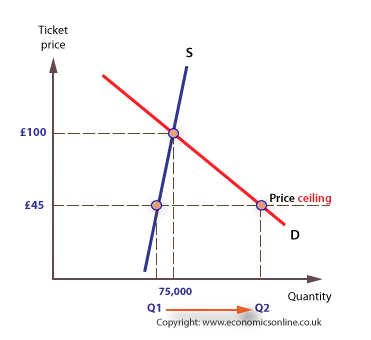
Non market price
Non-market price
In the real world, market price might not be allowed to find its own level, and markets might not clear efficiently. The prices of many goods, services, and resources might be kept artificially low or high by private firms, by governments, and by various agencies, for a number of reasons.
Price ceilings
A price ceiling may be set to prevent price from rising beyond a pre-determined level. A price ceiling will only have an effect on the market if it is set below the prevailing market clearing price. A price ceiling is also called a maximum price, and may be used if it is felt that the resource or commodity should be more widely available, as in the case of food or medicines, or where there are specific historical, political or cultural reasons why allowing price to rise to its natural level. For example, it is customary in London to make public transport free late on New Year’s Eve to enable revellers to get home safely.
UK Premiership football clubs also limit the price of their tickets to levels well below the natural market rate for three main reasons. Firstly, football is the UK’s national winter sport and, historically, ticket prices have been affordable for those on average incomes. Secondly, a large share of club income is generated from the sale of broadcasting rights to TV companies, and this supplements revenue from ticket sales, as does revenue from merchandising and sponsorship. Thirdly, there would be considerable political uproar if ticket prices were not held down below market price.
Demand for tickets outstrips supply at the artificially low price.

As has been noted, when market price is allowed to rise whenever resources are especially scarce, as in the case of tickets to a football match, the price mechanism works to ration out the tickets based on the willingness and ability of consumers to pay a higher price. However, if a price ceiling exists exists, a different method of rationing resources must be found.
Non-market allocation of resources
In the case of a football club like Manchester United, fixing artificially low ticket prices means that the relative shortage of tickets must be dealt with in non-price ways. Football clubs may use all, or some of the following methods:
- Arranging a ballot for ticket allocations.
- Implementing a first come first served queuing system.
- Sale of tickets through supporters clubs.
- Setting up a ticket exchange scheme, as in the case of Manchester United’s One United system.
- Bundling low priced tickets with an exclusive hospitality ticket.
Parallel or black markets may emerge to satisfy the excess demand, with ticket touts paying more than the face value of the ticket, and then selling them to other buyers at even higher prices.

Price floors
Price may also be set above the natural market price. A price floor, which is also referred to as a minimum price, sets the lowest level possible for a price.
If the floor is higher than the prevailing market price, it becomes a minimum price, and is the lowest level possible for a price. Price floors, and minimum prices, only have an effect if they are set above the actual market clearing price. There are many instances where governments set price floors A national minimum wage for labour is a common example of setting a price floor. In addition, given the instability of agricultural prices and the need to ensure food security, farm prices may be set which guarantee a minimum price to farmers.
When price floors are set above the natural market clearing price, suppliers may be encouraged to over-supply, while consumers are discouraged from consumption. Black markets may also arise in this case to exploit the consumer’s desire to pay less than the official price, as in the case of illegal imports of cheap, non-taxed imported cigarettes.

Read more – Court rules that Scotland can introduce minimum price for alcohol


